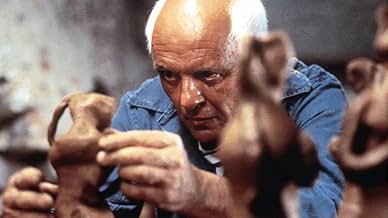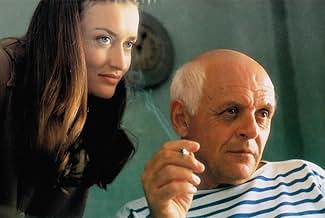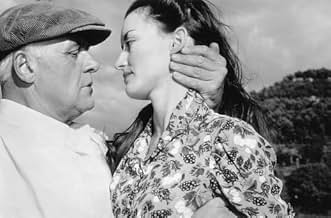CALIFICACIÓN DE IMDb
6.3/10
8.1 k
TU CALIFICACIÓN
Cuenta la historia de Françoise Gilot, la única amante de Pablo Picasso que fue demasiado fuerte para resistir su crueldad y seguir adelante con su vida.Cuenta la historia de Françoise Gilot, la única amante de Pablo Picasso que fue demasiado fuerte para resistir su crueldad y seguir adelante con su vida.Cuenta la historia de Françoise Gilot, la única amante de Pablo Picasso que fue demasiado fuerte para resistir su crueldad y seguir adelante con su vida.
- Dirección
- Guionistas
- Elenco
Allegra Di Carpegna
- Geneviève
- (as Allegra di Carpegna)
- Dirección
- Guionistas
- Todo el elenco y el equipo
- Producción, taquilla y más en IMDbPro
Opiniones destacadas
It's a pity that many of the user comments on this movie are simply a vehicle for people's dislike of Picasso, and that they treat the film as though it were a documentary. Picasso may have been as sex-mad, egocentric, paranoid and capricious as any Hollywood star (think Chaplin); but first and foremost he was a prodigious artist, who transformed our view of visual art, and dealt with some of the great themes of western culture. And presumably it was those latter qualities which drew women to him, in the same way that women have been drawn to successful, powerful men of dubious character since the dawn of time.
The movie and Hopkins' performance are certainly successful in displaying Picasso's human weaknesses; but there is a failure to adequately convey Picasso's enormous creative power, a weakness compounded by the fact that the makers were not allowed to use much of his work in the film. I see the film as a well made, excellently acted, but partial (in both senses of the word) portrait of the artist. Its real focus is the women in his life, especially Francoise Gilot, and on the two-way exploitative nature of the relationship between a man of this kind and his mistresses/wives.
The movie and Hopkins' performance are certainly successful in displaying Picasso's human weaknesses; but there is a failure to adequately convey Picasso's enormous creative power, a weakness compounded by the fact that the makers were not allowed to use much of his work in the film. I see the film as a well made, excellently acted, but partial (in both senses of the word) portrait of the artist. Its real focus is the women in his life, especially Francoise Gilot, and on the two-way exploitative nature of the relationship between a man of this kind and his mistresses/wives.
Period drama masters Merchant Ivory tackle one of Spain's most iconic artists, or rather, his love life. Francoise Gilot (Natascha McElhone) becomes eloped with the eccentric painter (Anthony Hopkins) during WW2, and the film follows the highs and lows of said relationship as she goes from wide eyed girl to lover to mother of the hot blooded artist's kids.
James Ivory's biopic of Picasso's premiere mistress does have good performances, even if the usually great Hopkins, disappointingly, never fully transforms into the legendary painter and so instead, the film ends up being carried by McElhone as a sympathetic yet ultimately frustrated and abused woman. There are also some welcome moments of humour, usually via Picasso's rather upfront comments & observations about others, and even some inventive flashback sequences that take on Picasso-esque aesthetics with very Cubist rooms and characters.
However, the screenplay never really explores why Gilot or the other women are drawn to and stay with Picasso, despite his duplicitous nature and often angry temperament. The film paints him (hah) as a genius, but also as kind of shameless and a bit of a manbaby, but the why, fame aside, is never looked at in any meaningful way. It's very much the token 'well, it happened in real life, so it's here' card of lazy biopics. Hopkins being given a two-dimensional Picasso doesn't help.
Furthermore, Picasso's art never gets much attention nor examination, missing a great opportunity for parallels and psychological exploration of our leads. This is an unbelievable blunder if you're going to even bother making a film on the man in the first place, as there's a lot of rich subtext to mine and would've helped with defining more of Picasso and his appeal.
Unless you're a Merchant ivory completionist, stick with Remains of The Day.
James Ivory's biopic of Picasso's premiere mistress does have good performances, even if the usually great Hopkins, disappointingly, never fully transforms into the legendary painter and so instead, the film ends up being carried by McElhone as a sympathetic yet ultimately frustrated and abused woman. There are also some welcome moments of humour, usually via Picasso's rather upfront comments & observations about others, and even some inventive flashback sequences that take on Picasso-esque aesthetics with very Cubist rooms and characters.
However, the screenplay never really explores why Gilot or the other women are drawn to and stay with Picasso, despite his duplicitous nature and often angry temperament. The film paints him (hah) as a genius, but also as kind of shameless and a bit of a manbaby, but the why, fame aside, is never looked at in any meaningful way. It's very much the token 'well, it happened in real life, so it's here' card of lazy biopics. Hopkins being given a two-dimensional Picasso doesn't help.
Furthermore, Picasso's art never gets much attention nor examination, missing a great opportunity for parallels and psychological exploration of our leads. This is an unbelievable blunder if you're going to even bother making a film on the man in the first place, as there's a lot of rich subtext to mine and would've helped with defining more of Picasso and his appeal.
Unless you're a Merchant ivory completionist, stick with Remains of The Day.
Pablo Picasso portrayed by the only woman to have survived his narcissistic, manipulative, patronizing and womanizing tendencies and come out of the minotaur's labyrinth, his studio, before he shatters her. A great performance of the master painter and sculptor genius by Anthony Hopkins who is a master actor himself adequately next to his young co-stars. I am a great admirer of Picasso myself and I really appreciated all the research to fit every detail in its place to make this kind of biographical film. I'm very fond of the relationship Picasso had with Henry Matisse despite their differences and the competitiveness between them.
A bio-pic on the life of artist Pablo Picasso focusing on his wilder side his rampant relationships with his many women, as seen from the perspective and understanding of the mother of many of his children Françoise Gilot.. We pick up the story where Gilot meets Picasso with the intention of becoming his student.
I was slightly interested in this film as it seemed to have a high quality cast. I must admit that I have little interest in art and have a very limited knowledge of the work and life of Picasso. However I was open to learning and I hoped this film would enlighten me in some way either in his work or his life. The film's focus is Picasso's private life rather than his work, this was an odd decision not to weave any of his work into the film in a significant way but it didn't put me off. What DID put me off was the fact that the film didn't involve me to the degree I had hoped it would. I'm not a consistent fan of Merchant & Ivory films simply because, unless they get it bang on (Remains of the Day) then they do leave me feeling a bit cold. Here that detached feeling was what I had the whole way through I never felt for any of the characters or situations and never really got involved in the film, it was simply on in the same room as I was sitting more than me watching it.
It's a shame because the film is beautifully made for all their faults, Merchant & Ivory films usually get that right. The sets and locations add to the film and are well shot. The cast is the main reason for watching this. Hopkins does very well in the lead and is running free for much of it. It confused me that I couldn't manage to link to his character maybe I was watching Hopkins act as opposed to seeing the character. It's ironic that his best performance for Merchant & Ivory was the total opposite of this in Remains of the Day (controlled, low key, subtle). McElhone is partly responsible for me not feeling involved in the film. I felt she was too cold, too emotionless and not expressive enough in the lead female role. Good support is given by Moore and others, and Ackland is good as Henri Matisse.
Overall this is not as awful or boring as some would have you believe Hopkins performance saves it from being that. But it did not involve me at all I was left quite cold to it even though the passion in Hopkins' performance made me think I was missing something. It's hard to put into words but this film doesn't manage to hold the interest not because of the subject, but more likely in the way it has been delivered.
I was slightly interested in this film as it seemed to have a high quality cast. I must admit that I have little interest in art and have a very limited knowledge of the work and life of Picasso. However I was open to learning and I hoped this film would enlighten me in some way either in his work or his life. The film's focus is Picasso's private life rather than his work, this was an odd decision not to weave any of his work into the film in a significant way but it didn't put me off. What DID put me off was the fact that the film didn't involve me to the degree I had hoped it would. I'm not a consistent fan of Merchant & Ivory films simply because, unless they get it bang on (Remains of the Day) then they do leave me feeling a bit cold. Here that detached feeling was what I had the whole way through I never felt for any of the characters or situations and never really got involved in the film, it was simply on in the same room as I was sitting more than me watching it.
It's a shame because the film is beautifully made for all their faults, Merchant & Ivory films usually get that right. The sets and locations add to the film and are well shot. The cast is the main reason for watching this. Hopkins does very well in the lead and is running free for much of it. It confused me that I couldn't manage to link to his character maybe I was watching Hopkins act as opposed to seeing the character. It's ironic that his best performance for Merchant & Ivory was the total opposite of this in Remains of the Day (controlled, low key, subtle). McElhone is partly responsible for me not feeling involved in the film. I felt she was too cold, too emotionless and not expressive enough in the lead female role. Good support is given by Moore and others, and Ackland is good as Henri Matisse.
Overall this is not as awful or boring as some would have you believe Hopkins performance saves it from being that. But it did not involve me at all I was left quite cold to it even though the passion in Hopkins' performance made me think I was missing something. It's hard to put into words but this film doesn't manage to hold the interest not because of the subject, but more likely in the way it has been delivered.
The movie is about Francoise Gilot, not about Picasso. It is not intended to tell Picasso's story. Picasso was brilliant, spectacular, the living center of the world of art and a sexual magnet. Women wanted him and, king that he was, Picasso viewed their adoration as no more than his due.
Francoise Gilot, a talented painter in her own right - but no Picasso - lives for ten years a life which for her is absolutely worth the pain. And when the pain is so grave that she will surely be overwhelmed, she stands up and leaves. The pain doesn't go away instantly, but it does go away, in time.
In one memorable scene, Gilot, at home with the baby, questions Picasso's absences, his obvious womanizing. He tells her in no uncertain terms that he will do as he chooses, that his life outside their home is none of her business. She has no right to question him. He doesn't say, "Take it or leave it," but that is the unmistakable message. She takes it, for a few more years, and another child.
It would be interesting to know whether Gilot, who was born in 1921 and is apparently still with us, harbors regret. I cannot imagine that she does. Of course she would have enjoyed that ten years better if Picasso had been able to love, in some recognizable way. But would she trade that life for one less magnificent? For one that would not be a good movie? Hardly.
The acting is of course perfect. Anthony Hopkins becomes the man Picasso. Natascha McElhone, Julianne Moore and Susanna Harker tell us the truth. Well paced, finely directed, this movie tells a riveting story. It is very, very good.
It is perhaps worthy of note that many of the negative reviews of this movie are written by men. Picasso was not just difficult; he was a Difficult Man.
Francoise Gilot, a talented painter in her own right - but no Picasso - lives for ten years a life which for her is absolutely worth the pain. And when the pain is so grave that she will surely be overwhelmed, she stands up and leaves. The pain doesn't go away instantly, but it does go away, in time.
In one memorable scene, Gilot, at home with the baby, questions Picasso's absences, his obvious womanizing. He tells her in no uncertain terms that he will do as he chooses, that his life outside their home is none of her business. She has no right to question him. He doesn't say, "Take it or leave it," but that is the unmistakable message. She takes it, for a few more years, and another child.
It would be interesting to know whether Gilot, who was born in 1921 and is apparently still with us, harbors regret. I cannot imagine that she does. Of course she would have enjoyed that ten years better if Picasso had been able to love, in some recognizable way. But would she trade that life for one less magnificent? For one that would not be a good movie? Hardly.
The acting is of course perfect. Anthony Hopkins becomes the man Picasso. Natascha McElhone, Julianne Moore and Susanna Harker tell us the truth. Well paced, finely directed, this movie tells a riveting story. It is very, very good.
It is perhaps worthy of note that many of the negative reviews of this movie are written by men. Picasso was not just difficult; he was a Difficult Man.
¿Sabías que…?
- TriviaA few years after this movie, Sir Anthony Hopkins had already signed on to play Hannibal Lecter in Hannibal (2001), but Jodie Foster had declined. When director Ridley Scott let Hopkins know what actresses were being considered to play Clarice, Hopkins remembered how much he enjoyed working with Julianne Moore on this movie, and recommended her.
- Citas
Pablo Picasso: I really like intelligent women. Sometimes, of course, I like stupid ones too.
Selecciones populares
Inicia sesión para calificar y agrega a la lista de videos para obtener recomendaciones personalizadas
- How long is Surviving Picasso?Con tecnología de Alexa
Detalles
- Fecha de lanzamiento
- País de origen
- Sitios oficiales
- Idioma
- También se conoce como
- Surviving Picasso
- Locaciones de filmación
- Productoras
- Ver más créditos de la compañía en IMDbPro
Taquilla
- Presupuesto
- USD 16,000,000 (estimado)
- Total en EE. UU. y Canadá
- USD 2,021,348
- Fin de semana de estreno en EE. UU. y Canadá
- USD 87,054
- 22 sep 1996
- Total a nivel mundial
- USD 2,021,348
- Tiempo de ejecución2 horas 5 minutos
- Mezcla de sonido
- Relación de aspecto
- 1.85 : 1
Contribuir a esta página
Sugiere una edición o agrega el contenido que falta




































